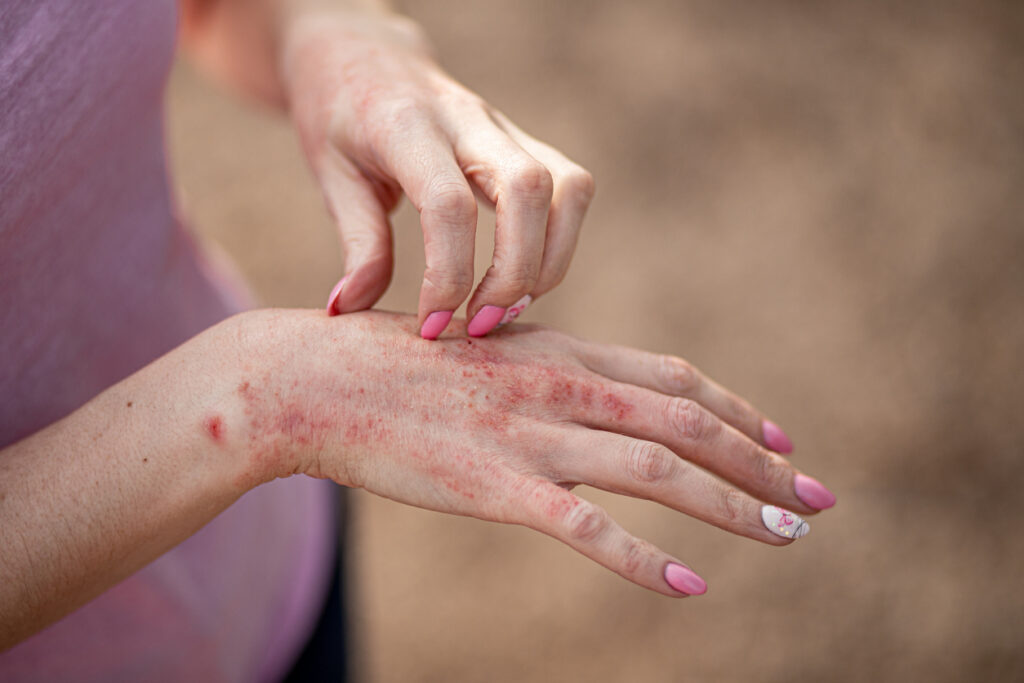Ninety-five percent of U.S. dermatology providers agree that moderate-to-severe chronic hand eczema (CHE) has a strong impact on patients’ work and home life, according to the second phase of the survey sponsored by LEO Pharma Inc.
The survey, which includes responses from 100 doctors and 92 nurse practitioners (NPs) or physician assistants (PAs) in dermatology, found 93% of these dermatology providers believe CHE impacts their patients’ emotional health, and 92% say moderate-to-severe CHE impacts their patients’ ability to perform daily activities, like typing at a computer, which is critical in today’s workforce. (See Part 1 of the survey here)
“Given that we use our hands for almost everything we do, chronic hand eczema can significantly disrupt patients’ daily routines,” says Raj Chovatiya, MD, Ph.D, MSCI, Clinical Associate Professor, Rosalind Franklin University of Medicine and Science Chicago Medical School and Founder and Director of the Center for Medical Dermatology + Immunology Research in Chicago, IL, in a news release. “Many of my patients struggle with simple household tasks like washing dishes, cleaning, or even using a keyboard for work. The toll on their self-confidence and mental well-being can be overwhelming. It is important that we continue to shed light on the complexities of chronic hand eczema, deepen our understanding of this debilitating condition, and ultimately help patients reclaim their lives.”
Additional Findings
Additional survey findings revealed:
- CHE has a strong impact on family and romantic relationships, including dating, according to providers surveyed. Seventy-two percent (72%) of healthcare providers in the survey said moderate-to-severe CHE impacts the dating life of their patients, and 72% said CHE impacts their patients’ relationships with family and friends. Sixty-eight percent (68%) of survey respondents agree CHE has impacted their patients’ desire to be intimate in their relationship with a significant other.
- CHE has a negative impact on the U.S. workforce, with many barriers for patients. Eighty-six percent (86%) of healthcare providers in the survey said moderate-to-severe CHE has caused their patients to struggle at work. Fifty-four percent (54%) said CHE impacts their patients’ financial situation, and 51% agree CHE has caused their patients to stall in their careers.
- CHE is more than skin deep, with the condition impacting other areas like sleep. Ninety-two percent (92%) of these healthcare providers said moderate-to-severe CHE causes their patients to feel self-conscious, and 85% agreed CHE impacts their patients’ ability to sleep.
“The National Eczema Association (NEA) acknowledges the urgent need for more awareness of chronic hand eczema among healthcare professionals and the public,” adds Wendy Smith Begolka, NEA Chief Strategy Officer. “We recognize the far-reaching and frustrating impact it can have on people’s lives, and the importance of finding solutions to better manage this burdensome disease.”
Unmet Needs
To date, there are no topical therapies approved by the U.S. Food and Drug Administration (FDA) to treat CHE. Many topical treatments for CHE have been studied, including calcipotriene, pimecrolimus, tacrolimus, clobetasol, triamcinolone, and halobetasol.
A systemic therapy, alitretinoin, is approved in Canada, the European Union, South Korea, and Israel. Dupilumab (Dupixent, Sanofi & Regeneron) was FDA-approved in January 2024 for treating moderate-to-severe atopic dermatitis affecting the hands and/or feet in people aged 12 and older. This is why there is a great deal of excitement about the topical CHE treatment pipeline. Delgocitinib cream (LEO Pharma, Anzupgo), a pan-Janus kinase (JAK)-inhibitor, is in clinical trials. Delgocitinib cream is currently approved in the European Union and Switzerland for treating moderate-to-severe CHE in adults for whom topical corticosteroids are inadequate or inappropriate.
The survey was conducted by Ipsos.


